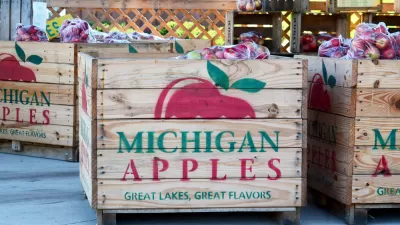The Common Orchard Project has planted ten orchards in vacant lots in Cincinnati. The organization hopes to plant 100 urban orchards by the end of the decade.

"Vacant lots are a blight to communities across the country, and Cincinnati is no different. According to an inter-departmental study on vacant land and health in Philadelphia, blighted plots affect residents’ well-being, physical health, and mental health," warns The Common Orchard Project, an organization replacing vacant lots with fruit-bearing trees.
WVXU reporter Ann Thompson caught up with the project's founder and permaculturist, Chris Smyth, at the first orchard at Schiff Ave and Glenway Ave in West Price Hill. Smyth says the organization plans to plant 100 orchards in the next decade.
"It's easy to drive by the intersection of Glenway and Schiff avenues and not realize this green space is actually a 'food forest' that is helping feed people who live in the neighborhood," Thompson writes.
Once home to two unused, crumbling buildings, the lot now supports "apple, cherry, pear, pecan and plum trees" as well as medicinal plants and other vegetation that promote healthy trees by fending off pests and providing nutrient-rich soil.
So far, Smyth's team has planted 10 orchards in Cincinnati. "Smyth sees Common Orchards as a way to bridge the gap between vacant property and eventual development," says Thompson. The Common Orchard Project team hopes to promote the project and see orchards across Ohio.
FULL STORY: A Fruitful Effort Is Happening Near Cincinnati's Food Deserts

Maui's Vacation Rental Debate Turns Ugly
Verbal attacks, misinformation campaigns and fistfights plague a high-stakes debate to convert thousands of vacation rentals into long-term housing.

Planetizen Federal Action Tracker
A weekly monitor of how Trump’s orders and actions are impacting planners and planning in America.

San Francisco Suspends Traffic Calming Amidst Record Deaths
Citing “a challenging fiscal landscape,” the city will cease the program on the heels of 42 traffic deaths, including 24 pedestrians.

Defunct Pittsburgh Power Plant to Become Residential Tower
A decommissioned steam heat plant will be redeveloped into almost 100 affordable housing units.

Trump Prompts Restructuring of Transportation Research Board in “Unprecedented Overreach”
The TRB has eliminated more than half of its committees including those focused on climate, equity, and cities.

Amtrak Rolls Out New Orleans to Alabama “Mardi Gras” Train
The new service will operate morning and evening departures between Mobile and New Orleans.
Urban Design for Planners 1: Software Tools
This six-course series explores essential urban design concepts using open source software and equips planners with the tools they need to participate fully in the urban design process.
Planning for Universal Design
Learn the tools for implementing Universal Design in planning regulations.
Heyer Gruel & Associates PA
JM Goldson LLC
Custer County Colorado
City of Camden Redevelopment Agency
City of Astoria
Transportation Research & Education Center (TREC) at Portland State University
Jefferson Parish Government
Camden Redevelopment Agency
City of Claremont




























